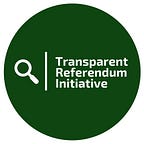Questions we’re working on part 1: Ensuring neutrality and trust in a divisive referendum environment
By Liz Carolan, TRI’s volunteer transparency specialist.
This is the first is a series of blogs we’ll publish on the questions we are working on.
My fellow volunteers and I are launching the Transparent Referendum Initiative with
- an analysis of a problem: that the lack of transparency in online political ads is a danger to having a fair, open and honest debate in the upcoming Irish referendum on abortion
- a goal we want to achieve: to build an open, searchable database that bring these ads out into the public so journalists and citizens can scrutinise them
BUT we still have lots of questions remaining in terms of how we actually get to achieve that goal.
This is not an accident, and it is not impatience. We are launching now because we believe that we will be able to build a better, more robust project by answering the remaining questions out in the open, with feedback and advice from the people around us. Here is the first one we are looking at:
How do we design a project that people can trust, in the highly divisive environment of a referendum campaign?
The success or failure of this project will rest on whether or not people can trust the database of online political ads we plan to build. They need to trust that this list of ads has not had things secretly added or taken away, and that the collection process and any filtering has not been biased towards or against any side of the debate.
This is especially important in the highly divisive environment of a referendum campaign.
The TRI as a project is neutral on the question of this and any future referendum. This does not mean that our volunteers (myself included) as individuals, hold no opinions on the question. While all volunteers commit to upholding the principles of integrity and neutrality in this project, it is in everyone’s interest that we find ways to structure the project so people can trust it without having to take just our word for it.
As I have written elsewhere, data is only as neutral as the systems we put in place to collect, manage and store it. So we are looking at at least two distinct aspects of the process; how do we collect and (possibly) filter the data, and how do we store it and manage access.
Data collection
PLAN A: Our hope for this project is that the social media platforms will “see the light” in terms of transparency and supply data on paid political ads directly and openly. This would mean they identify all ads being placed that are directed at Irish voters, that mention keywords or the themes of the referendum, and set up an API (a data feed) that the TRI will then use to feed our database. Ideally this is an open API, which would mean that it is available to anyone else who wants to use it — including those who want to check that we haven’t changed anything.
PLAN B: If the platforms can’t do this, we will use a crowdsourcing tool (we’re currently in discussions with WhoTargetsMe). These tools collect ALL ads that individuals who chose to use the tool are targeted with. This includes non-political ads for things like a new phone or flight to Prague). This means there would need to be process of filtering to pull out ads related to the referendum to publish in our database.
Here, our thinking is that this filtering will be automatic; that an algorithm or robot go through the full database and pull out ads to publish based on it finding a keyword or hashtag related to the referendum, or finding an ad that comes from an account identified as active in the debate. Our thinking at the moment on the best way to ensure that these filters can be trusted, is to be transparent with them. This will mean publishing the list of keyword, hashtags and accounts that the robot looks for, and let people feedback where we have made mistakes or where there are gaps.
The real pain point here is the filtering. The more we look into this, the more empathy I have with the platforms. But we believe that being open in terms of the filter terms is the best way deal with the challenge of appearance of bias.
Data storage
We aim to have a neutral third party host and manage all the data that we collect. In an ideal world we don’t even touch it. This should to be a respected, neutral, third party institution. It has been suggested to us (by the fantastic web archiving team at the National Library of Ireland) that a digital repository at a university could be a good way to go. Here especially we are open to suggestions.
So that is where we are up to in our thinking. If you have any ideas or suggestions, we would love to hear them. Pop it in the comments below, or drop us an email via info@tref.ie
